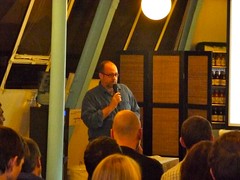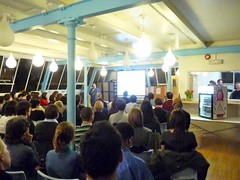Christian Crumlish – Wallacespace, Covent Garden
 I went along to see Christian Crumlish speak at Covent Garden Wallacespace. Christian is the curator of the Yahoo! Design Pattern Library and co-author of Designing Social Interfaces, and he did a fine hour-long talk (plus questions) about how design patterns can be used for building social websites.
I went along to see Christian Crumlish speak at Covent Garden Wallacespace. Christian is the curator of the Yahoo! Design Pattern Library and co-author of Designing Social Interfaces, and he did a fine hour-long talk (plus questions) about how design patterns can be used for building social websites.
My notes, incomplete as they are, read:
Patterns originated in the Architecture Community. Once you discover rules and patterns, they can be used in other situations. Architects missed the benefit of patterns, but Computer Scientists got it. Patterns and wikis have a similar base, as they were originated within the same crowd.
Yahoo!’s Pattern Library, of which Christian is the 3rd Curator, is the sibling to Yahoo! User Interface.
Delicious and Flickr popularised tagging, both were bought by Yahoo! But both have different implementations of tagging.
People take the code and design on top of it. People didn’t think they needed the telephone – it took people a while to figure out how it could be used for business. Business is done through it. Blogs are like that – they don’t necessarily bring money in, but business is done through them. The network effect of having millions of phones connected escalates their value, just as it does with having many people connected via a website.
People used to phone a place – ‘is such-a-person there?’ – where now we phone a person, or even a pocket.
Christian offered up with 5 Principles – not set in stone, not without exceptions, but strong guidelines. These principles, were tested at Barcamps etc, and eventually became Designing Social Interfaces:
Pave the Cowpaths
Look at the behaviour that is already happening and facilitate that.
Talk Like A Person
Don’t do corporate speak etc, your web copy should be conversational to set the tone you want your users to use. These include:
- Conversational voice
- Self-deprecating Error Messages
- Ask Questions
- Your vs My (‘Your’ gives context – someone else is saying ‘Your’, it is inclusive – with ‘My’ you’re out on your own)
- No joking around (sarcasm, in-jokes often don’t translate online – your audience might not get the humour)
Play Well With Others
- Embrace Open Standards
- Allow data outside the bounds of your application
- Accept external data within the sphere of your app
- Support two-way interoperability
Learn from Games
There are things about games which apps can learn. For example, reward participation. Got to give up some control to your users. For example, the designers who build Never Ending Game went on to build Flickr – a game-like culture was transferred.
Respect the Ethical Dimension
Every social website has an ethic dimension. Don’t spam, don’t pester.
Other gems Christian doled out:
- Give people a way to be identified
- Social Objects – Things people have a common interest in, something to rally around. They keep people involved, they allow the site to grow organically
- Give people something to do – eg upload videos – let them be involved
- Let the community elevate people and content they value – 3rd party moderation doesn’t scale
- Enable a bridge to real life events
- Anti-patterns! – Things which seem like a good idea at the time but later on shows itself to be bad eg copying a successful website but not understanding what makes it successful
- Don’t break email – eg NoReply is a bad idea
Overall, this was a great evening (Yahoo! always put on great events) with a capacity audience stacked right to the back of the cafe. I have a few more photos here.




Leave a Reply